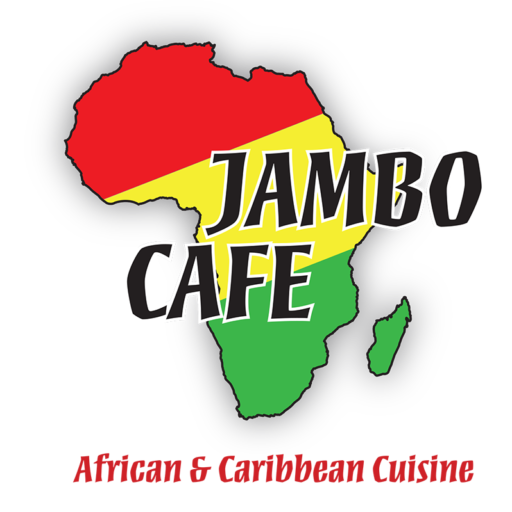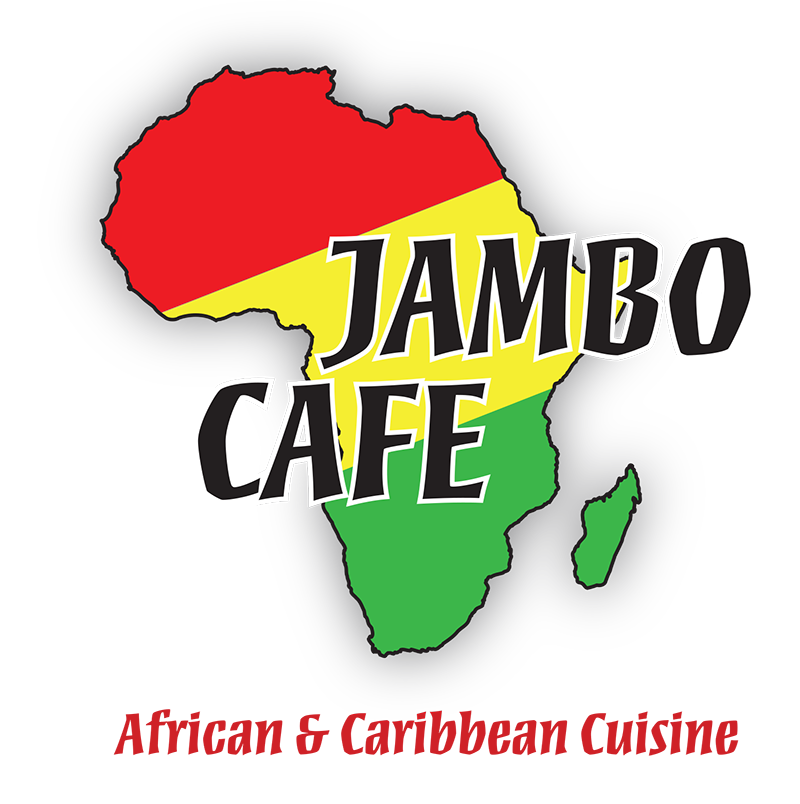Eating Words with Chef Ahmed Obo
Local Flavor | April 2018
(Story by Mark Oppenheimer; Photos by Stephen Lang)
Riding the dream of being a mechanic, Ahmed Obo came to America to start a new life. At the insistence of a friend working at a restaurant, Ahmed hit the road again, and made his way to Santa Fe with his then-wife. Persistent, determined and fueled by the desire for a better life amidst doubt and uncertainty, he meanwhile uncovered something within himself that had been there all along. Ever humble, a caring and generous man, Ahmed found that the skills he’d used to survive by fishing off the coastal waters of Lamu Island, Kenya, were the very foundation, the pathway, that led him to open the wildly successful Santa Fe restaurant, Jambo Cafe. It was my great pleasure to listen to his story.
Mark Oppenheimer: What feeds you and what do you feed?
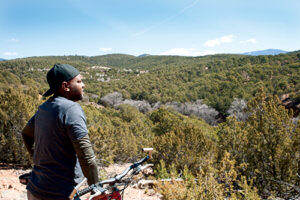
Image by Stephen Lang
Chef Ahmed Obo: What is in me and gives me pleasure is giving back. I created the clinic in my hometown in Kenya for me to know I can help and turn somebody’s life better. It fills my soul. Coming to that a long time ago, I started working young. I would save my money and bring it to my mom so she could feed my brothers and sisters, and when the holidays came, I would buy clothes for them. So now once in a while, this is mentally, I would go to the beach and this guy owned a wind-surf rentals, and I would surf the wind. This would feed me. But my joy really was just to see my family, to know they’re fed, they’re happy. Now, since I am blessed with more, I do more.
Mark: Your father taught you about hard work. Did you get from your father what you think a boy needs?
Ahmed: I did have some questions growing up about what I was going through. He was not much of an advisor. He would not really go deep and talk––he wasn’t that kind of person. He was more of a physical presence. Different people filled that role, one person was my uncle; he occasionally advised me, and I used his advice, but mostly it was my observation and the whole experience of what was happening all around me. Growing up as a Muslim in Africa, we always have basic things that we learned and heard from different people in the village. It takes a whole village to raise a child. So you hear and see from the village, “You don’t do this, you don’t do that; you respect your mom, you respect your dad.” They told us if you want to pay back your mother, you have to cook for her on the palm of your hand. Can you do that? Can you cook your food and feed your mom out of your palm to pay her back that she give you birth? Does that make sense? There’s no way you can cook out of your palm and feed her.
Mark: When you decided to move to America, did your parents feel betrayed or were they supportive?
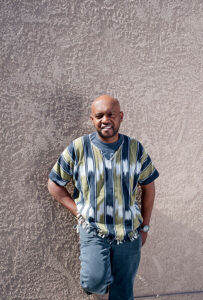
Image by Stephen Lang
Ahmed: When I told him I’m leaving, I’m going to America, my dad, he wasn’t real for it. He said you have a good life here––you can do it here, you can work and make your living in Kenya. My mom, she was OK with it, she said, “You need to go experience and travel the world and you’ll learn.” Usually, the dad is the one who has to permit you, but I was 22 when I left Kenya, so I could make my own decision. But at the end, he was OK. The minute I left, of course, he didn’t hold back and he wrote me a letter and said, “We’re going to pray for you and that my support will be praying for you, I cannot give you anything but my support.” He knows prayer is a big thing for us. The first year of living away from home was a lot of emotion. I wrote a lot of letters to them. There was no email or anything like that then. We just wrote letters to each other, and it was a beautiful moment when you receive the letters. Like, wow, OK. I would write a letter to them and send some photos and there was a lot of support back and forth.
Mark: At 13, you bought and refurbished a dhow (boat). At 17, you took tourists fishing, and afterwards cooked the catch for them. Seems as though you’ve been in the hospitality business your whole life.
Ahmed: I was a teenager when I first got the dhow, it was like an ugly old car and you fix it up here and there, you just love it––there’s other more beautiful cars out there you can go get, but yours is the one that you want. You ask me this and it brings it back to life. The truth is, sometimes I do sit back and think [how] it was a beautiful time in my life because here we come in struggling, growing up so poor––now I have this vessel, the dhow, where I can go fishing and bring some food to my family. I’m so in love with this dhow. I don’t know where this dhow is going to take me. I know it’s going to take me fishing, right? But we don’t know our future. Right now, I’m hanging onto Jambo, I’m so in love with it but I don’t know what the next thing is going to lead me.
Mark: What do you consider to be an essential quality of a chef?
Ahmed: For me, personally, patience is something every chef must have. [Patience] is giving the food the time and the thought. Some people look in the cookbook and go through it, but for me, when you are creating something [it’s]: Am I satisfied? I used to say, “Would this satisfy my mom?” This is where I know my expectation is: to please my mother. That is what I would tell my cooks and myself. I understand there is enough taste there, salt and spices. Will the spice transfer? Is it too hot? Is somebody not going to like it? Will my mom like it? Personally, what would be my level is: Would my mother be satisfied?
Mark: In your culture, men don’t cook in the home. Talk more about this.
Ahmed: I learned to cook from watching my mom cook, but I think the tourists influenced me [on the boat tours] for me to be able to cook. They pushed me, so it was OK for me to cook. We need to survive, and when I would go out in the boat to take them fishing, there were no women, so I had to cook. For some people in my culture it is kinda like a big deal for them to say they cook, but for me, it is a natural thing. In my culture, if some men are cooking, it’s kind of a shameful thing for them. But the difference is this: I was not cooking for my family. Even today, I have not to “sit down” and cook for my family like I’m actually cooking professionally, the difference is that. But if I were to invite you to come to my house, I would be cooking up a storm. My sister still asks when I’m home in Kenya, “When are you going to cook for us?” [I say,] “When I return, then I will cook for you guys, but right now, I’m not cooking for you.” I’ve developed a different style, like here, you know, we are standing up, and in Kenya they usually sit down. [Points to a very low African style chair.] Somebody can sit in that and grate a coconut and feel comfortable, I can’t cook like that.
Mark: Explain sitting down and cooking for your family.
Ahmed: They are starting to modernize, but growing up, that was the style of cooking. When they cut the vegetables and [grate] the coconut, you’re sitting down on a low chair. The stove is down in the ground at the floor, everything is there. To cook African-style, I have to go back and learn again. I don’t think I’ll be able to do it at this age now; I’ll have to create a counter for me, and a stove. I mean, it’s a lot easier. Because all days you have to go find firewood, charcoals, making the fire. Propane is in use, but mostly still charcoal in the cities. My family would love for me to cook for them, I just tell them to be patient. Some day, when I’m done working, I’ll bring all this experience from America to share with them.
Mark: Your dishes are very vibrant and sensuously spiced––what do you think about food and sex?
Ahmed: [Laughs] They attract each other. They go well together. There will be places where people go out, where do they go? They go to eat. Then they start to eat oysters or shrimp, and if there is a spice into it, that creates attraction and momentum of intimacy. It’s the same thing like music and food. You gotta be strong to be able to have sex, so you have to eat first, helps with the mood, too. If you’re hungry, I don’t know if you can perform, right? Can you? Maybe not as good as if you eat a goat stew and Ugali. You have to try to eat the goat stew and Ugali; it’s an aphrodisiac. I don’t know if people have the experience. The spices we use… you as a chef know how they affect your body: cayenne, coriander, ginger, turmeric, they all are like medicine. They get your body flowing, especially in the wintertime, they are of great benefit to your body.
Mark: Cooking East African cuisine professionally while assimilating to American culture is courageous. Was it difficult?
Ahmed: When I come here, my thing is to blend into the American culture, which I did for 14 years—I did American culture. My kids are American. My experience: I did not think my food was something that Americans will respond to. Now, when I go and see the front of the restaurant, the place is packed and I see these people, their smile and it’s like, wow!––the moment, it gets me. These people are here for my food, something that I created. I never thought of it when I just moved here. Now I’m thinking, is there anything else I can even do better? People say I have the niche for this kind of food. When I opened the restaurant, I had a lot of moments where it’s scary, I’m doing this African food and what’s going to happen? It was something building up and building up for years. So what are you going to do with the dream when it’s not a dream anymore? I had to stop the dream and open the restaurant. I don’t know if you get those scary moments when opportunity is there and you’re not driving it? What am I doing? It was like that. So that’s why the restaurant [in the beginning] was just a small, tiny restaurant where I can make a few dishes. Now, it’s out of my body, out my head, so it’s out for people to see, it’s real. After I did it, I [saw] the reality was the real thing, those moments are always saying, “Hey! This is real.” But then again, the only way to know is just to do it.
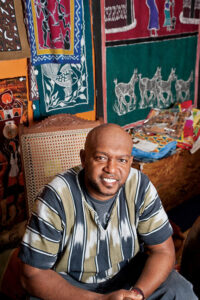
Image by Stephen Lang
Mark: Your country is known for its warmth and hospitality, how did that prepare you for coming to America?
Ahmed: When we were living on a farm on the mainland, people from the small island of Lamu will cross the channel on their journey. They always stopped by our small farm. It was an opportunity for us to talk. My mom would always prepare tea. We always welcome travelers with food or water. There were no phones, maybe a radio, but little access to it, and they would tell us what is going on in Lamu: [whether] somebody died, etc. If you cannot give them food, you give them water. Water is tradition. When you come in, I offer you a chai. We learn you don’t even have to ask. People will always say no, but you’re still going to ask. For us, always, you’re welcome. Being around all this experience made me who I am: open hearted. If you grow up tight, and your family, when they come in, they don’t open the door to other people, your heart is closed. At that time, growing up, I wasn’t talking. I was more listening, and when you would listen and experience different people talking and opinions, it opens you up more because people, they share information that you don’t have. To me, you have to be the one opening your heart to hear it. But if you are [closed], those people they are not going to talk to you. With Jambo, honestly, here I opened people up. A lot of times, I can feel the love, I can see in the food when they come here, and for me, I was able to go out and share my story, and they [share] their story. So this is who I am.
Mark: Did you choose to become a cook or did it choose you?
Ahmed: It chose me. How it chose me was from cooking on the dhow just to make a living. When I first arrived here, seriously, this is honest, I want to be a mechanic. I maybe want to be in construction. I knew I didn’t want to cook. Back in Africa, I cook. I want to do something different here in America. Visiting a friend here in Santa Fe, slowly, slowly, I just started as a prep cook, helping them out, then got hired. I then went to another place. I did not enjoy it at first. From there, I am just in the kitchen and from that time, I really started to enjoy it, making all those dressings, cutting, prepping and making sauces. I was learning things. It shifted really quick from really wanting to be a mechanic, to wanting to be a cook. It wasn’t a struggle, it was a natural transition. I think we all carry around within us a hidden talent and other people see and they embrace you. Now, looking back, this is my journey starting from the boat coming here and becoming a sous chef and becoming a restaurant owner. So before I become a restaurant owner, I have to value my journey. Why do I want to open a restaurant? It’s a lot of work. I’m from Africa, I have an opportunity to come here and be a success. I’m grateful for being in this country because I know what I have if I was in Africa, I would possibly do this, but not the way they value [my food] here in this country. When you open up, some people can see it. I will tell you a story that was amazing: I was running to a table with the food, this lady says, “Excuse me, one second, you don’t know me, and I don’t know you, but I have something to tell you: This is your place, this is your creation, you have created this. Do not let anybody take it away from you. The love, the stars, so let your star start shining. This is yours, I don’t know what it is, but there’s something in you that’s stopping you from shining. You will shine and you’re the one, the only one that knows.” She was right, and I figured out right away what was holding back my shining. It was a great life on Lamu Island. I’m thinking now I want to go back home to Kenya with what I have created with Jambo. I think it would be so rich, and mentally being with what I learned from here. I know I can survive anything.
